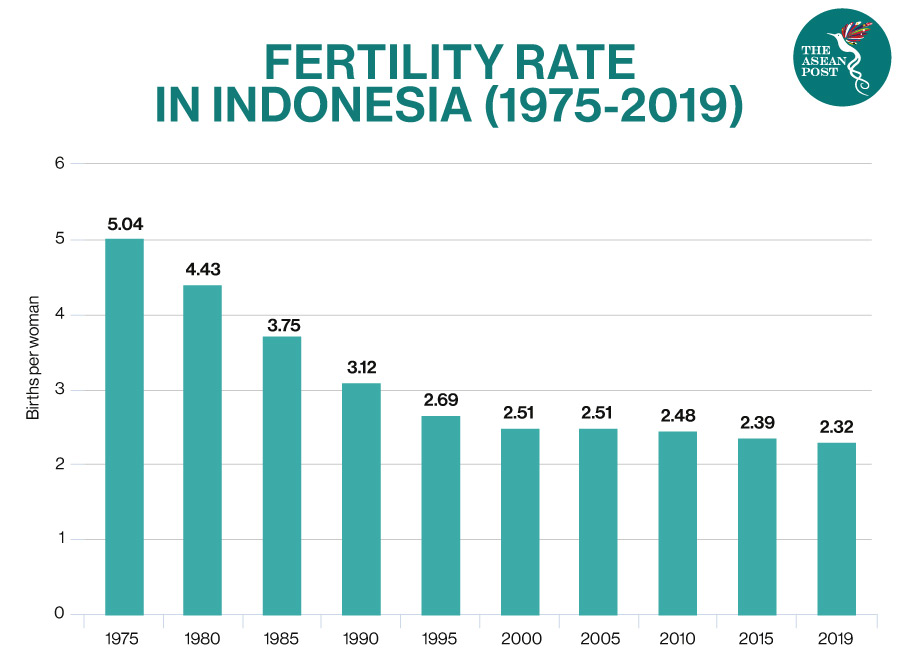With over seven billion humans inhabiting our crowded planet, forests have mostly disappeared, animal species have gone extinct and the Earth’s atmosphere keeps getting dangerously warmer by the day.
The number of humans is expected to grow to nine billion people by 2050 and reach 11 billion by 2100, according to the United Nations (UN). Further population growth will only create a future of increasing poverty, acute food shortages, conflicts, and environmental degradation.
Two Children Are Enough
Indonesia, the world’s fourth-largest country in terms of population size, is expected to grow from a population of 276 million to 311 million by 2045. This projection is based on data from Statistics Indonesia's (BPS) 2018 report, ‘Indonesia Population Projections 2015-2045’.
The archipelago’s former National Development Planning Minister Bambang Brodjonegoro who is now the Minister of Research and Technology said that to hit 311 million people, there must be an average of two children per family and an infant mortality rate of three percent per year.
Once the population reaches 311 million, the country will have an ageing population, as the percentage of elderly will reach 19.8 percent for the entire country. An ageing society will lead to other challenges ahead.
In the 1970s, Indonesia’s National Population and Family Planning Board (BKKBN) was launched to address the population boom. The BKKBN had two goals – to establish a “small, prosperous family” as the norm in Indonesia and to reduce fertility through the promotion of contraceptives. At the time, Indonesia had a five percent contraceptive prevalence rate (CPR) and a 5.6 total fertility rate (TFR).
The BKKBN’s family planning efforts and ‘two children are enough’ campaign achieved remarkable results. In 2000, the TFR dropped by 54 percent, from 5.6 births per woman to 2.6. In 2019, the country boasted a 61 percent CPR and 2.3 TFR. The nation’s target of a replacement-level fertility rate of 2.1 births per woman by 2025, to stabilise its population growth, seemed within grasp.

Critical Planning
Effective family planning not only addresses the challenges posed by a growing population, but it is critical for a healthy, stable, and prosperous future. Family planning empowers women to make informed decisions about their bodies and to actively exercise their rights to health, wellbeing and education among others.
It is easier for married women to have access to different types of contraceptives in Indonesia today.
“In our efforts to achieve the desired [total fertility] rate, the BKKBN has striven to improve access to and the quality of health and contraceptive care services in areas across the country,” said the agency’s family planning and reproductive health division deputy head, Dwi Listyawardani.
The BKKBN revealed that religious leaders played an important role in promoting family planning in an otherwise conservative country. Major Muslim organisations such as Nahdlatul Ulama and Muhammadiyah advocated for family planning and the use of contraception, saying that the two were allowed in Islam as they allowed Muslims to create prosperous families and strong successors.
Baby Boom
Other than snatching the lives of millions of people around the world, the coronavirus pandemic has affected livelihoods, businesses, and our way of life in general.
A recent concern that has troubled Indonesia is the possibility of a baby boom amid the health crisis.
Back in July 2020, Indonesia’s authorities projected that there could be 400,000 more births than usual in 2021 as COVID-19 preventive measures keep couples at home and cut access to contraception. This has prompted fears among observers of an increase in abortions and stunting of children in poorer families.
The BKKBN also stated that the number of people using contraception “dropped drastically” since the pandemic began in early March last year. "Our data shows a 10 percent decrease in the use of contraception from March to April… that is two to three million people," said Hasto Wardoyo, Head of the body.
Indonesia is also warning women not to get pregnant during coronavirus lockdowns. In a campaign back in May, government vehicles equipped with loudspeakers roamed Indonesian towns and cities, barking a blunt message: “You can have sex. You can get married. But don’t get pregnant. Dads, please control yourself. You can get married. You can have sex as long as you use contraception.”
Although other countries such as India and Malaysia also expect a baby boom due to stay-at-home measures, some experts say that “a baby boom is unlikely to happen during the COVID-19 crisis,” said Liz Allen, population expert at the Australian National University.
Allen said that Australians are less likely to have babies due to the uncertainties created by the pandemic.
Moreover, United States (US) data shows large declines in births nine months after COVID-19 was declared a national emergency. It was reported that more than 50,000 fewer births occurred in the US in 2020 compared to the year earlier. This comes despite speculations that couples isolated together during lockdowns might produce a year-end baby boom.
Related Articles:
